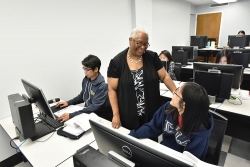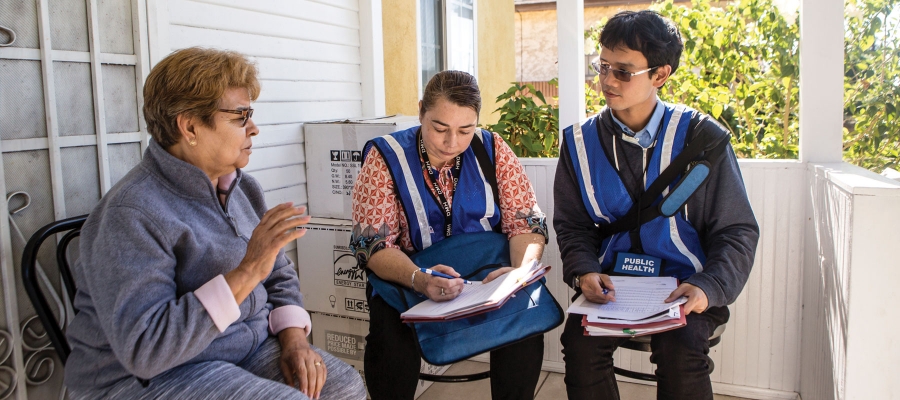The strong ties between the Fielding School and the L.A. County Department of Public Health (LACDPH), which date back decades, continue to reverberate to the benefit of public health in the region.
“I felt it was essential that the department, as an operating agency, have connections with UCLA as a major academic institution that kept current on the research and was engaged in educational programming,” says Dr. Jonathan Fielding, who served as LACDPH director until 2014 and remains a professor-in-residence at the school (see page 22). “And for the school, such connections bring in people who are in the trenches and up to date on the latest problems, as well as on the realities of what can be done in public health practice. Equally important, the department provides a place where students can go to apply what they’re learning in the classroom in real time.”
Although Fielding retired from his county position in 2014, the FSPH-LACDPH ties remain as strong as ever, with both sides continuing to reap substantial rewards. A number of senior LACDPH members teach courses at the school, while others are brought in as guest lecturers. Dr. Robert Kim-Farley (MPH ’75) is an example of the former: The director of the Communicable Disease Control and Prevention Division at LACDPH, who is also professor-in- residence in FSPH’s departments of epidemiology and community health sciences, teaches Principles of Control of Infectious Diseases. For the course, Kim-Farley invites several of his LACDPH colleagues to speak to FSPH students on issues such as immunization and current or recent outbreaks.
Dr. Paul Simon (MPH ’90), chief science officer for LACDPH and an adjunct professor in FSPH’s Department of Epidemiology, has taught Public Health Surveillance at the school since 1998, drawing on LACDPH experts to provide guest lectures for about half of the class sessions. Simon notes that many LACDPH staff also benefit from informal educational opportunities at the Fielding School.

Dr. Lisa V. Smith (standing) is both an adjunct associate professor of epidemiology at the Fielding School and an epidemiologist at The L.A. County Department Of Public Health, where she directs the rapid assessment, training and evaluation team.
In some cases the LACDPH staff education is informal, while other times specific training channels are established. For example, Dr. Hilary Godwin, professor in FSPH’s Department of Environmental Health Sciences, and her doctoral students worked collaboratively with LACDPH staff to develop a series of interactive workshops on the projected health impacts of climate change and how LACDPH staff can leverage their existing expertise and partnerships to help build more resilient communities. In addition to educating staff, FSPH faculty experts have been called on to consult on specific issues. Dr. Michael Jerrett, professor and chair of the Department of Environmental Health Sciences, worked with LACDPH on environmental air pollution monitoring in response to the massive gas leak that began in 2015 in the Los Angeles community of Porter Ranch.
FSPH faculty and LACDPH staff also collaborate on research of interest to both the school and LACDPH. “Since coming to UCLA in 2008, I have benefited greatly from the relationship between FSPH and LACDPH,” says Dr. May Wang, professor in the Fielding School’s Department of Community Health Sciences.Wang has collaborated on several research projects with Simon and Dr. Tony Kuo (MS ’03), acting director of LACDPH’s Division of Chronic Disease and Injury Prevention and an adjunct associate professor of epidemiology at FSPH — most recently on a large National Institutes of Health-funded study using state-of-the-art modeling techniques to evaluate community-based early-childhood obesity prevention strategies. “These research collaborations also provide training and networking opportunities for our master’s and doctoral students,” Wang says. “Such a close collaboration between an academic institution and the local health department is relatively rare and so helpful for creating innovative synergies in translational research and training the next generation of public health professionals and scientists.”
The strong relationship between the school and the county public health department is a boon to the many FSPH students who fulfill their fieldwork requirement through LACDPH internships. “Students are able to see the day-to-day realities of working in a public health department, and that helps them in their own career decision-making,” Kim-Farley says. In addition to MPH students working in various roles, Fielding School PhD students have partnered with LACDPH programs for their dissertation research. Students in the school’s Department of Epidemiology regularly conduct analyses of LACDPH’s robust health data sets, Kim-Farley adds, providing important insights to the county while fulfilling a degree requirement.
Many Fielding School students who gain experience at LACDPH become full-time employees after graduating. “The county benefits as much as the school from the opportunities presented by these internships,” Simon explains. “We are able to identify very talented students who are interested in working in a local health department and connect them with their areas of interest, and it becomes a great pipeline for us. We need well-trained young people to join our ranks, and with the training students receive at the Fielding School they come in well prepared.” In many cases, Simon notes, FSPH students who started with entry-level positions at LACDPH have advanced to high-level positions within LACDPH and/or at state and federal agencies.
Beyond the practical benefits to LACDPH, Kim-Farley sees personal rewards. “It’s very satisfying to engage with the next generation of public health professionals — to be able to mentor and help guide them in their careers,” he says. “At the same time that we’re preparing students to be potential LACDPH hires, we also have the opportunity to excite and inspire them about careers in public health.”
Original Article at https://ph.ucla.edu/news/magazine/2017/autumnwinter/article/perfect-pairing
Magazine:

